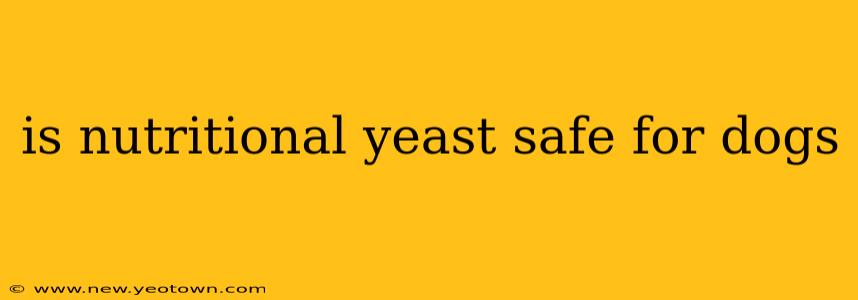Is Nutritional Yeast Safe for Dogs? A Tail of Two Ingredients
The question of whether nutritional yeast is safe for dogs isn't a simple yes or no. Like many human foods, the answer hinges on several factors, primarily the quality and quantity of the yeast offered. Let's unravel this canine culinary conundrum.
My journey into this topic started with a curious sniff from my own dog, Buster, at a sprinkle of nutritional yeast I was using in my cooking. His wagging tail and hopeful eyes prompted my research, and I discovered a fascinating world of nutritional benefits—and potential pitfalls—for our furry friends.
What is Nutritional Yeast?
Before we delve into safety, let's understand what we're dealing with. Nutritional yeast is a deactivated yeast—meaning it's been heated to kill it, rendering it unable to reproduce. This inactive form is what makes it safe for consumption, both for humans and (usually) dogs. It's a complete protein, rich in B vitamins, fiber, and other essential nutrients. Its cheesy, nutty flavor often makes it a popular addition to human food and, potentially, dog treats.
Is Nutritional Yeast Safe for Dogs to Eat?
Generally, yes, nutritional yeast is considered safe for dogs in small amounts. The key is moderation. Too much of anything can be detrimental, and nutritional yeast is no exception.
What are the Benefits of Nutritional Yeast for Dogs?
Several potential benefits exist:
- B Vitamins: Nutritional yeast is packed with B vitamins, crucial for energy production, nerve function, and a healthy coat. A dog's diet might lack these essential nutrients, and nutritional yeast can help bridge that gap.
- Protein: It's a good source of complete protein, beneficial for muscle growth and repair.
- Fiber: The fiber content can aid in digestion and promote healthy bowel movements.
However, it's important to remember that a balanced, commercially prepared dog food generally provides all necessary nutrients. Nutritional yeast should be considered a supplement, not a replacement, for a dog's main diet.
Can Nutritional Yeast Make Dogs Sick?
While generally safe, several factors can influence whether it makes a dog ill:
- Quantity: Overfeeding can lead to digestive upset, including diarrhea, vomiting, or gas.
- Quality: Always opt for a pure, unflavored variety. Some commercially available nutritional yeast contains added ingredients that might not be suitable for dogs.
- Pre-existing conditions: Dogs with certain allergies or digestive sensitivities might react negatively.
How Much Nutritional Yeast Can I Give My Dog?
There's no universally agreed-upon amount. A good rule of thumb is to start with a tiny amount—a pinch or less—and observe your dog's reaction. If no adverse effects are noticed, you can gradually increase the quantity, but always keep it a small portion of their daily food intake. Consult your veterinarian for personalized guidance.
Does Nutritional Yeast Have Any Side Effects?
The most common side effect is digestive upset, particularly if given in large quantities. Less frequently, allergic reactions can occur. Keep a close eye on your dog for any signs of discomfort.
Can I Give My Dog Nutritional Yeast Every Day?
Daily consumption isn't necessary, and it's generally recommended against. Occasional use as a tasty supplement or as a component of homemade dog treats is perfectly acceptable, but a balanced diet should be the priority.
What Kind of Nutritional Yeast is Best for Dogs?
Choose a pure, unflavored variety without added salt, sugar, or other potentially harmful ingredients. Many brands specifically market nutritional yeast for human consumption and are suitable for dogs as well.
My experience with Buster involved introducing him to tiny amounts of nutritional yeast sprinkled on his regular food. He enjoyed the taste, and I didn't observe any adverse effects. However, this is my personal anecdote; always prioritize careful monitoring and veterinary advice. Remember, responsible pet ownership includes carefully considering any dietary additions.

